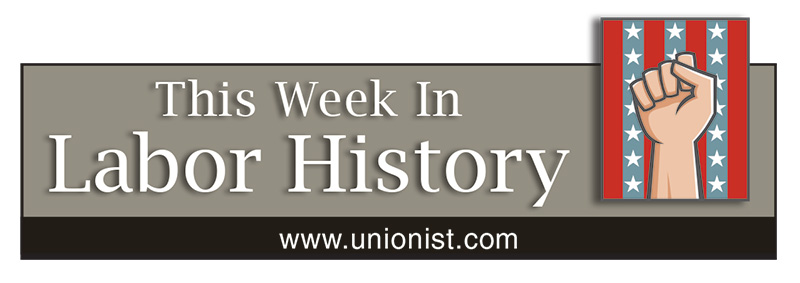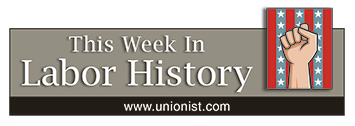
November 10th
1933 – At the Hormel plant in Austin, Minnesota, a sit-in strike begins with the help of a Wobbly organizer, leading to the formation of the Independent Union of All Workers. Labor historians believe this may have been the first sit-down strike of the 1930s.
1975 – The ship Edmund Fitzgerald – the largest freighter on the Great Lakes – and her 29-man crew are lost in a storm on Lake Superior while transporting ore from Superior, Wisconsin, to Detroit. The cause of the sinking was never determined.
1988 – Tile, Marble, Terrazzo Finishers, Shop Workers and Granite Cutters Int'l Union merges to form United Brotherhood of Carpenters & Joiners.
November 11th
1887 – Haymarket Martyrs are hanged and convicted for the bombing of eight police officers during a Labor rally in Chicago.
1919 – Six people are killed in a confrontation between American Legionnaires and Wobblies during a ceasefire parade in Centralia, Washington. A wobbly was reportedly beaten, had its teeth smashed in with a rifle butt, was castrated, and hanged; local officials ruled his death a suicide.
1940 – A total of 57 crew members on three freighters die within three days when their ships sink during a massive storm over Lake Michigan.
November 12th
1954 – Ellis Island in New York closes after serving as a gateway for 12 million immigrants from 1892 to 1924. From 1924 to 1954, it was used primarily as a detention and deportation center for undocumented immigrants.
1966 – “Chainsaw Al” Dunlap announces restructuring of Sunbeam Corp. and lays off 6,000 workers – half of the workforce. Later, Sunbeam nearly collapsed after a series of scandals under Dunlap's leadership that cost investors billions of dollars.
November 13th
1909 – A total of 259 miners died in the underground fire at the Cherry Mine. As a result of the disaster, Illinois enacted stricter safety regulations and in 1911 the basis for the state's Workers Compensation Act was passed.
1914 – A Western Federation of Miners strike is crushed by militia in Butte, Mont.
1927 – The Holland Tunnel opens, running 1.6 miles under the Hudson River and connecting the island of Manhattan in New York City to Jersey City, New Jersey. During the seven-year construction, 13 workers died.
[1945[1945 – Postwar strike by GM workers for higher wages closes 96 plants.
November 14th
1903 – Founding of the Women's Trade Union League, Boston.
1934 – The American Railway Supervisors Association is founded at Harmony Hall in Chicago by 29 supervisors working for the Chicago & North Western Railway. They organized after realizing that the railroad workers working under their supervision already had the benefits of unionization and were being paid more for fewer hours worked.
1938 – The National Federation of Telephone Workers – later the Communications Workers of America – is founded in New Orleans.
1978 — The Jimmy Carter-era OSHA issues a standard to reduce allowable lead exposure, protecting 835,000 workers from damage to the nervous, urinary and reproductive systems.
1979 – The Professional Athletes Association received a charter from the AFL-CIO.
November 15th
1881 – The founding meeting of the Federation of Trades and Labor Unions takes place in Pittsburgh. She pushes for the passage of employer liability, compulsory education, uniform training, and child and convict labor laws. Five years later it changed its name to the American Federation of Labor.
November 16th
1927 – A district judge in Punxsutawney, Pennsylvania, grants an injunction sought by Clearfield Bituminous Coal Co. that prohibits strikers from speaking to strikebreakers, posting signs indicating a strike is underway or even singing hymns. Union leaders called the injunction “drastic.”
1982 — The National Football League Players Association is ending a 57-day strike that shortened the season to nine games. The players wanted a larger share of the team's gross revenue, but were unable to achieve this until many years later.
(Compiled by David Prosten, founder of Union Communication Services)
